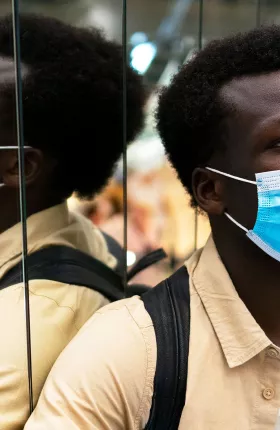When a global pandemic is disrupting your supply chain and you’re scrambling to get products in bags and on shelves while ensuring that manufacturing plants operate safely, focusing on reducing single-use plastics or cutting water consumption might seem a stretch. But what if failing to address these things ends up costing money and weakening the business down the line?
This is what we are hearing when we talk to the heads of the leading consumer companies. They know that consumer and investor pressure to embrace sustainability is not going away. They know that abandoning their efforts now could pose serious risks to the business in the future and make picking up the sustainability agenda later impractical or unaffordable. And they are looking for pragmatic ways in which to advance their goals.
It is true that some environmental regulations have been eased because of the pandemic. Prompted by health concerns, for example, some regulators have reversed bans on single-use plastics.
But as governments plan the relaunching of their economies, they are thinking about how to recover to a fair, resource-efficient, and resilient society. For example, a quarter of the European Union’s €750 billion ($868 billion) COVID-19 recovery fund has been earmarked for climate action. The fund also excludes environmentally damaging investments. And in South Korea, the newly elected government is pursuing a Green New Deal that includes a carbon tax, a focus on renewable energy investments, an obligation to end coal investments, and a hydrogen strategy.
Among consumers, the crisis has driven the sustainability agenda forward. Consumers already wanted to know more about the origins of what they buy. Now, they are more focused than ever on health and safety and are showing strong support for the businesses in their local communities.
A recent BCG survey examined how the pandemic has shifted global consumer attitudes toward environmental issues. Ninety percent of consumer respondents said they were equally or more concerned about these issues after the COVID-19 outbreak, and nearly 95% said they believed their personal actions could help reduce unsustainable waste, tackle climate change, and protect wildlife and biodiversity, with 27% to 30% noting that this belief had strengthened as a result of the crisis.
Meanwhile, online retail has taken on new significance in people’s lives during the pandemic. And with this trend expected to last beyond the crisis, companies face increasing pressure to compete in the digital sphere.
Savvy consumer companies have been responding. Our analysis shows that, on the basis of their actions, they fall into three broad categories:
- At a minimum, companies have been implementing programs focused on employee welfare, introducing social distancing and hygiene practices, and support for suppliers.
- Some companies are doing more by adapting sustainability agendas to the shifts in consumer demand prompted by the pandemic, such as localizing supply chains, introducing technologies such as blockchain to enhance transparency on product sourcing and manufacturing, adapting pack types and sizes for online sales, and prioritizing products suitable for consumption at home.
- Really savvy consumer companies are doing things differently. These companies are seeking new opportunities by integrating sustainability across core business operations and making it part of the organization’s strategic fabric, whether through minimizing packaging, cutting waste in supply chains, or optimizing delivery routes.
Given that companies are already making such fundamental shifts in their strategies, product lines, and operational models, it makes sense to build in sustainability along the way—rather than trying to retrofit at a later stage.
There is another compelling reason for maintaining a focus on sustainability efforts: Competitors are moving forward aggressively on their agendas.
When it comes to traceability, for example, Unilever has added to its sustainability goals— net zero emissions from its products, from cradle to shelf, by 2039 and investments of €1 billion ($1.1 billion) in climate-friendly initiatives over the next decade—with a plan to label all its 70,000 products with information on how much greenhouse gas they generated through raw ingredients, manufacturing, and shipping, right up to the point the product is picked up off the shelf.
In April, P&G announced that Old Spice and Secret deodorants would appear in plastic-free, paper packaging in certain Walmart stores as part of a 2030 goal to reach 100% recyclable or reusable packaging and a 50% reduction in virgin petroleum plastic consumption.
And in May, Mondelez announced it was on track to reach its targets of 100% recyclable packaging and 100% sustainable cocoa sourcing for chocolate by 2025. Nestlé is also making progress on its commitment to make 100% of its packaging recyclable or reusable by 2025, and it plans to reduce by one-third its use of virgin plastics by that year.
Evidence shows that investors may reward companies for these approaches as part of a broader focus on ESG (environmental, social, and governance) factors—particularly since ESG funds have outperformed benchmarks during the market downturn. In fact, BCG’s Investor Pulse Check found that 51% of investors think it’s important for healthy companies to pursue their ESG priorities fully as they navigate the crisis, even if it means lower earnings per share.
This means that putting a pause on sustainability agendas is a risky move. The difference between companies that scale back and those that move forward on sustainability will be that, in a postpandemic world, the latter will be in a better position to mitigate regulatory risks and benefit from consumer and investor preferences.
Of course, none of this is easy. And even before the crisis, many companies’ sustainability goals were looking hard to hit. However, this is not a reason for giving up. Moreover, the choice is not between launching a radically accelerated sustainability strategy and doing nothing. There is a third way.
Companies should focus on building back, but while doing so they need to ensure they’re building back better, reconsidering supply chain practices and implementing digital strategies that also advance transparency, traceability, and impact measurement. They should include the sustainability team in discussions about how to embed environmental and social impact into the changes being made as part of the recovery strategy.
Given the new challenges, current sustainability strategies need to be refreshed. To help with this, we’ve laid out a ten-point checklist for embedding societal impact into business strategy. (See the exhibit.)
Different countries are at different stages. Some are still battling infections. Some are flattening the curve. Others are reopening their economies. And resurgences of infection may accompany resumption of normal life. Companies must learn to live in a state where they are not necessarily in panic mode but are constantly ready to fight small fires. Of course, they also need to focus on building back. But sustainability should be considered a core part of that.
This means elevating the significance of sustainability across the enterprise by creating chief sustainability officer positions (similar to such positions as chief digital officer). Early examples appeared in 2004, when DuPont and Nike made CSO appointments. Today, a growing number of companies—among them Diageo, P&G, Mastercard, Nissan, Ralph Lauren, and Tyson Foods—are making their first CSO appointments.
In rebuilding after the crisis, sustainability is not an add-on. It’s about building competitive advantage, lowering risk, getting ahead of new regulations, gaining ground with investors, and adjusting to new consumer demands. And companies can get a better return on investment from the operational and supply chain changes that are already being made by embedding sustainability within those changes. A sustainability focus also builds resilience—although the link between sustainability and resilience was already evident, it has become even clearer during the pandemic.
For companies, all this flows back into long-term success. As we look into the future, one thing is clear: While some will cede ground on sustainability and social impact, consumer companies that choose to reset and reengage will make rapid progress on their goals—and that will not only enable them to reap greater benefit from their recovery investments but also give them a distinct competitive advantage.
This commentary was written in collaboration with our colleague Miranda Li.









